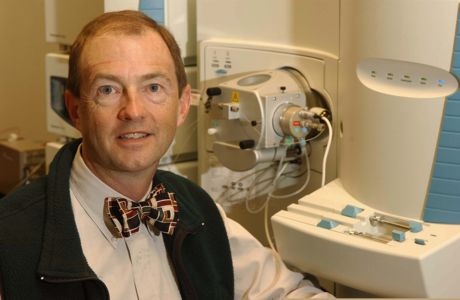

As the fall 2009 semester begins, more students are taking chemistry courses than ever before. This fall more than 3,600 students are enrolled in chemistry classes and laboratories in the Cook Building. An historical perspective of chemistry enrollments is shown in the bar graph below that documents the explosive growth.

Although increasing undergraduate enrollments explain some of the growth seen in chemistry classes, we also attribute much of this growth to the ever-increasing quality of the UVM undergraduate, bringing more and more students to UVM seeking professional careers in the health and related sciences. Given the large number of students to be taught, we offer primarily large-lecture sections, with 150-200 students in each. This fall we have more than 900 students enrolled in five lecture sections of general chemistry and 350 students in two sections of organic chemistry. These sections include students from the College of Nursing and Health Sciences, College of Agriculture and Life Sciences, College of Engineering and Mathematical Sciences, as well as all students seeking to obtain a medical degree (M.D., D.V.M., D.D.S., O.D., etc.) after graduation from UVM. Those wishing to pursue a post-graduate degree program need four semesters of chemistry, including two semesters of the dreaded organic chemistry, which acts as a rite of passage for many doctors-to-be.
For chemistry and biochemistry majors, however, we offer smaller, more focused classes, with about 50 students in general chemistry and 30 in organic chemistry. This provides a more intimate setting, giving chemistry and biochemistry majors more opportunity to be together and to interact with their professors.
Although we teach most of our students in large-lecture sections by necessity, all chemistry instructors take great pride in their teaching and have developed skills to teach effectively in a large-lecture-hall environment. For example, see our feature on Lecturer Alexander (Sandy) Wurthmann (UVM Ph.D. in Chemistry 2006), who received the Kroepsch-Maurice Excellence in Teaching Award in 2009. Sandy teaches both semesters of our organic chemistry sequence for pre-medical students and other science majors.
Research is another important focus of chemistry faculty members. There are too many successes in research to mention them here. Research grant funding has increased over the past several years - even in the face of dramatic limitations in research funding from national institutions such as the National Institutes of Health. For example, Profs. Giuseppe Petrucci and Matthews were successful in obtaining a major research instrument from the National Science Foundation. The award purchased a new $430,000 mass spectrometer with liquid chromatograph which will be a key instrument for many faculty in the department. Our junior faculty have also made excellent progress in establishing their laboratories and research programs, and in obtaining federal grant funding. We profile two professors here: Matthias Brewer and Rory Waterman, who have both received prestigious CAREER grant awards from the National Science Foundation. Prof. Waterman has also received two other highly prestigious awards: a Cotrell Scholar Award from the Research Corporation and an Alfred Sloan Foundation award.
Key to research in chemistry by faculty are the graduate and undergraduates who work with our professors as partners in research. This fall there are 40 graduate students in Chemistry from diverse backgrounds. Among them are three are from Africa, two from the Middle East, and four each from China and India; the remainder come from around the United States.
Most of our undergraduate chemistry majors find time to work in research groups with our professors and graduate students during their time at UVM. This training in research often spurs interest in pursuing graduate degrees in chemistry and related fields. Our students in chemistry and biochemistry are accepted into a range of programs across the United States - from Harvard University in the east and Duke University in the south to Washington University or Texas A&M in the middle of the country, to the Scripps Research Institute in the west. After completing their training, many of our undergraduate and graduate students have gone on to develop highly productive careers. For example, Michael MacCoss (UVM B.S. in Chemistry 1996 and Ph.D. in Chemistry in 2001) is now an Associate Professor of Genome Sciences at the University of Washington. Mike also just received a prestigious Presidential Early Career Award for Scientists and Engineers (PECASE) from the NIH.
The Department of Chemistry is also very proud of our undergraduate majors for their accomplishments while at UVM. We profile two undergraduates who completed their degrees this May. Joseph C. Wright was awarded the Hannah Howard Prize at the May 2009 College of Arts and Sciences Commencement Ceremony. This prize is awarded annually to the College of Arts and Sciences undergraduate student with the highest cumulative grade point in the College. Jillian Davidson received the 2009 Mariafranca Morselli Leadership Award from from the Women's Center. The Mariafranca Morselli Leadership Award is presented annually to an undergraduate woman majoring in a scientific discipline who has demonstrated leadership qualities, academic excellence and who has contributed significantly to the awareness on campus of the rights of women.
Of course, we depend upon the generosity of alumni and their gifts to make many of our programs possible. I draw your attention to the story about the new summer undergraduate student research fellowship that was just created through a gift from Louise Foley (UVM 1965). Louise remembers very well her summers spent working in the laboratories of Prof. Martin Kuehne (emeritus) and the benefit she gained from these experiences. She in turn established this year the Martin E. Kuehne Organic Chemistry Fund to honor her former professor's many contributions to the educational experience at UVM and to the field of organic chemistry. This endowed fund provides an annual summer stipend for an undergraduate chemistry major engaged in a summer research project in synthetic organic chemistry.
I hope you will enjoy reading more details about exciting accomplishments in Chemistry by faculty and students in our news section.
Dwight Matthews, Chair